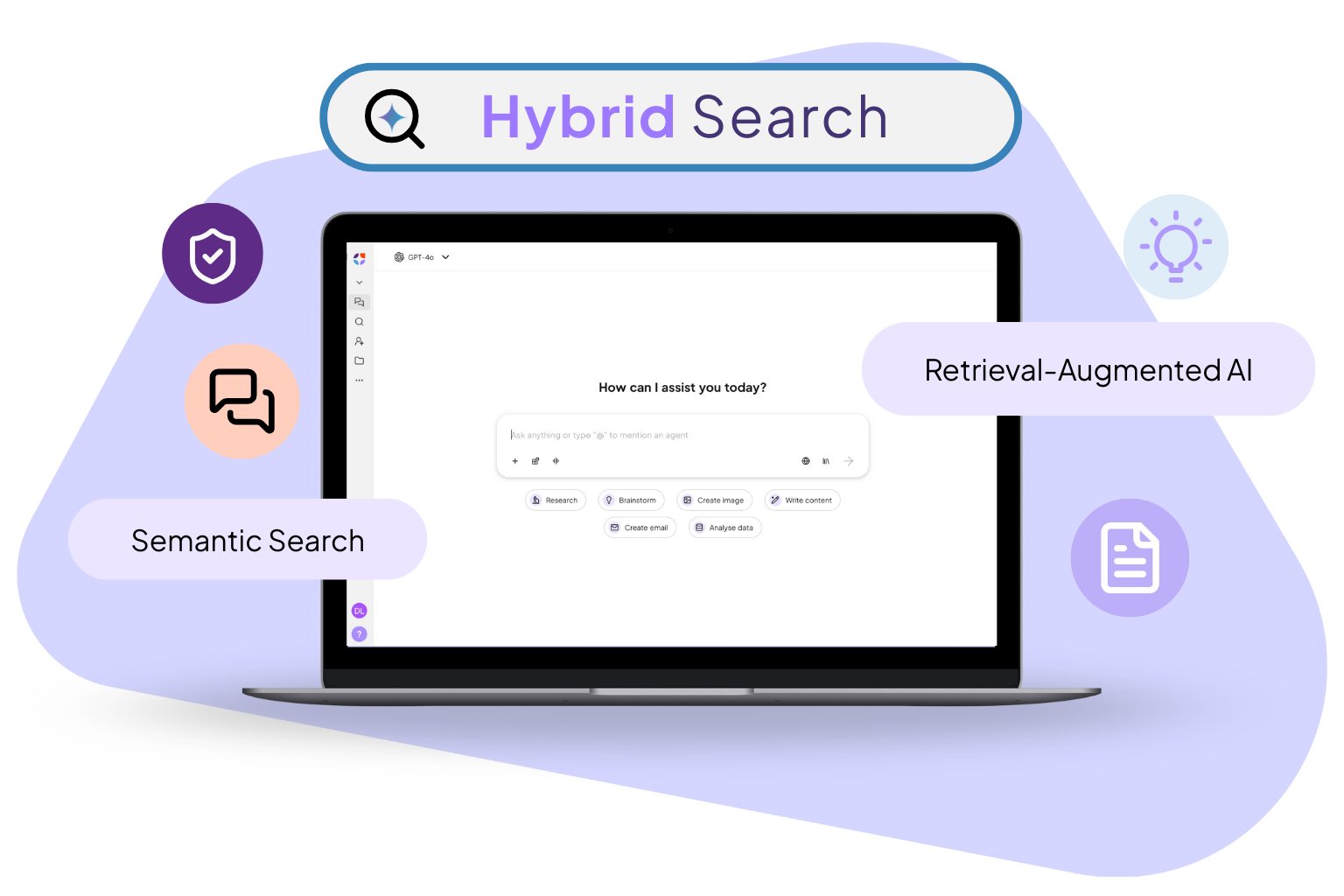Hybrid Search Enterprise – The Future of Enterprise Search

The search for relevant information has always been one of the biggest challenges in companies. Studies show that knowledge workers spend an average of up to 20% of their working time searching for documents, emails, or relevant data. In large organizations, this quickly adds up to millions of euros in opportunity costs every year.
But the problem is even bigger:
- Information is scattered across CRM systems, ERP solutions, document management systems, email archives, and chat tools.
- Traditional enterprise search often works with rigid keyword algorithms that require exact word matches.
- Results are often incomplete, outdated, or irrelevant.
- Employees are increasingly turning to public AI tools like ChatGPT to get answers faster – but this poses significant data protection and compliance risks.
The result:
- Loss of time – lengthy research instead of productive work.
- Faulty decisions because important information is missing or overlooked.
- Security risks as sensitive data flows uncontrolled into external systems.
It is clear: Traditional enterprise search is reaching its limits.
👉 This is where Hybrid Search comes in – a new generation of information search that combines semantic understanding with AI-powered answer generation.
Hybrid Search as a Solution: Definition, Functionality & Architecture
What is Hybrid Search?
Hybrid Search combines two approaches that are already strong individually – but together reach a whole new level of performance:
1. Semantic Search:
- Recognizes not only keywords but understands the meaning of a query.
- Example: A search for “holiday pay regulation” also finds documents mentioning “special payment” or “13th month salary.”
- Result: More hits with higher relevance.
2. Retrieval-Augmented Generation (RAG):
- Instead of simply outputting hit lists, the most relevant content is fed into a language model (e.g., LLM).
- The model generates a precise, context-rich answer, supplemented with source references.
- Result: Not just “search results,” but a direct, understandable answer with evidence.
Why Hybrid?
- Semantics alone is good but still only delivers hit lists.
- RAG alone is risky if the data base is not reliable.
- The combination of both methods ensures:
-
- Completeness (all relevant information is found)
- Precision (irrelevant results are filtered out)
- Compliance (every answer is based on documented sources within the organization).
-
How Hybrid Search Works in Practice
The process runs in four steps:
1. Understanding the search intent
- The query is analyzed to recognize context and intent.
- Example: “What changes were made to the Supply Chain Act in 2023?” → Focus on legal situation + timeframe.
2. Hybrid Search
- Combination of semantic queries (for unstructured data like PDFs, emails, reports) and classic search patterns (for structured data like CRM or ERP).
3. RAG Process
- The best hits are passed to an LLM.
- The LLM summarizes the information, formulates it in natural language, and refers to the sources.
4. Governance Layer
- Results are only displayed within the scope of permissions.
- Audit trails document which data was used.
- Compliance risks (e.g., GDPR) are minimized.
Advantages of the Hybrid Search Architecture
Speed: Answers in seconds instead of minutes.
Relevance: Semantic understanding ensures less “noise.”
Transparency: Every answer contains source references.
Security: Only approved data is searched.
Productivity: Employees no longer have to manually search different systems.
Hybrid Search in Practice: Use Cases & Example
1. Knowledge Management – Making Knowledge Usable
In large organizations, important information is scattered: in SharePoint, intranet, emails, project folders, or DMS systems.
With traditional search: Employees often need several minutes and different tools to find relevant information.
With Hybrid Search:
→ Simple query like “Project status digitalization location Hamburg.”
→ Immediate summary of the latest project reports, decisions, and documents.
→ Source links to all original files.
👉 Result: Efficient collaboration and fewer knowledge silos.
2. Compliance Research – Check Faster, Stay Safe
Regulations like GDPR, Supply Chain Act, or industry-specific standards require constant review.
With traditional search: Manual search in legal texts and internal guidelines.
With Hybrid Search:
→ Query: “What changes in the Supply Chain Act affect our suppliers in Asia?”
→ System combines internal contract data with current legal texts.
→ LLM provides answer + highlights relevant passages.
👉 Result: Faster checks, lower risk of violations, audit-proof documentation.
3. Customer Service – Answers in Seconds
Customer service staff often have to search various tools (CRM, ticket system, knowledge base) to answer inquiries correctly.
With Hybrid Search:
→ Query: “What is the current delivery status of customer X, order Y?
→ Immediate answer from ERP + CRM + email history.
👉 Result: 50% faster response times, higher NPS, fewer escalations.
4. Project Teams – All Info in One Place
Projects have protocols, decisions, technical documents, emails.
With Hybrid Search:
→ Query: “What decisions were made in project Phoenix in Q2?”
→ Answer contains: Summary + direct links to protocols.
👉 Result: Clarity, fewer meetings, better decisions.
Case Study: Financial Services Provider
A leading financial institution had the problem that compliance staff needed an average of 8 minutes to find relevant documents.
Before: Search in several databases, copy-paste into Excel, manual review.
After with Hybrid Search:
→ <20 seconds for the same research.
→ Complete summary including sources.
→ Time savings: 94% in research.
→ Additionally: Significantly fewer compliance violations, faster audits.
Hybrid Search Compared:
Why the Approach Is Superior
Companies today use various search technologies, which differ greatly in quality and utility. While classic keyword searches generate quick hit lists, they often deliver irrelevant or incomplete results. Semantic search already understands the meaning of a query but remains limited in answering. Only Hybrid Search combines the strengths of both approaches with RAG (Retrieval-Augmented Generation) – enabling precise, context-rich, and compliance-secure answers.
Comparison Table
| Criterion | Keyword Search | Semantic Search | Hybrid Search (Semantics + RAG) |
| Meaning-Oriented | Exact word matches only | Captures intent | Captures intent and context |
| Synonym Recognition | Very limited | Yes | Yes |
| Unstructured Data | Barely usable | Partially supported | Fully supported (documents, emails, transcripts) |
| Answer Generation | Result list only | Result list only | Context-based, precise answers |
| Source Citation | None | Partial | Always (incl. document links) |
| Governance & Security | Minimal | Limited | Fully integrated (access rights, auditing) |
| Business Value | Low | Medium | Very High |
Why Hybrid Search Is Superior
1. Relevance instead of noise
- Classic search often delivers a long list of hits. Employees have to filter themselves.
- Hybrid Search, on the other hand, delivers a ready, precise answer containing only the relevant info – supplemented with source links.
2. Context instead of single word
- Keyword searches are blind to meanings. “AI Governance” ≠ “AI Compliance.”
- Semantic search recognizes the proximity. Hybrid Search goes further: It understands the intent, analyzes the best sources, and creates an intelligent synthesis.
3. Governance instead of gray areas
- Public tools are fast but risky: Data can flow outwards.
- Hybrid Search in nuwacom ensures that permissions, GDPR, and audit trails are observed.
4. Productivity instead of time loss
- Instead of 5–10 minutes search per process: Seconds.
- At the enterprise level, this means: +60% faster access to information and noticeable relief for knowledge workers.
Business Impact in Numbers
- +60% time savings in research & information access
- Up to 70% fewer errors thanks to consistent data base
- Faster decisions because information is not only found but also interpreted
- Reduced compliance risks, as every answer is created within the governance framework
- Higher employee satisfaction due to less frustration from unsuccessful searches
👉 In short: Hybrid Search makes knowledge usable, secure, and productive – a clear competitive advantage for companies with high information volumes.

Why nuwacom Is the Leading Platform for Hybrid Search
The 4 Key Differentiators of nuwacom
1. Complete Hybrid Search Pipeline – Semantics + RAG
- Unlike providers who only use semantic search algorithms, nuwacom combines semantic search with Retrieval-Augmented Generation in an integrated architecture.
- The result: Relevant answers instead of hit lists – including source references and context.
2. Deep Enterprise Integrations
- nuwacom connects seamlessly with CRM, ERP, HR systems, DMS, collaboration tools, and compliance databases.
- This creates a single, central search across all important company data – without system breaks.
- Every search query is controlled by a governance layer: permissions, roles, audit trails, and GDPR checks are integrated.
- This means: 100% compliance security, even in regulated industries such as financial services, energy, or healthcare.
- nuwacom thinks beyond search: Results from Hybrid Search can flow directly into agent workflows.
- Example: A compliance agent monitors regulatory changes, an HR agent matches candidate profiles with internal guidelines – all based on the same search and governance architecture.
The Result for Companies
- Faster decisions because relevant information is available in seconds.
- More security because all results are GDPR-compliant and auditable.
- Less shadow IT because employees do not need to use external tools.
- Future-proofing because the platform is model-agnostic: Companies can use the best LLM for each use case (e.g., OpenAI, Anthropic, Aleph Alpha, or internal models).
👉 With nuwacom, companies get not just a single solution, but a strategic knowledge infrastructure that unites search, compliance, and automation.
FAQ
1. What is Hybrid Search?
2. How does Hybrid Search differ from traditional search?
- Traditional search: based on keywords, often finds only exact matches.
- Semantic search: understands meanings and synonyms.
- Hybrid Search: combines semantics with AI-powered answer generation (RAG) – incl. sources, compliance controls, and context.
3. Is Hybrid Search GDPR-compliant?
Yes – with proper implementation. In nuwacom, permissions, roles, audit trails, and data storage according to ISO 27001 are integrated, so every answer is data protection compliant and auditable.
4. What use cases are there for Hybrid Search?
- Knowledge management: find & summarize internal reports, contracts, and project data.
- Compliance research: retrieve laws & guidelines with sources.
- Customer support: service staff receive verified answers in seconds.
- Project teams: central search across all systems.
5. What technical requirements are needed?
6. Can Hybrid Search be integrated into existing systems?
7. How do I get started with Hybrid Search?
The recommended way:
- Start a pilot project with a clearly defined use case (e.g., compliance or knowledge management).
- Evaluate results & adjust governance.
- Gradual rollout to further departments.
Book a Demo Now and see firsthand how nuwacom’s Hybrid Search is transforming enterprise search.
Follow us on LinkedIn